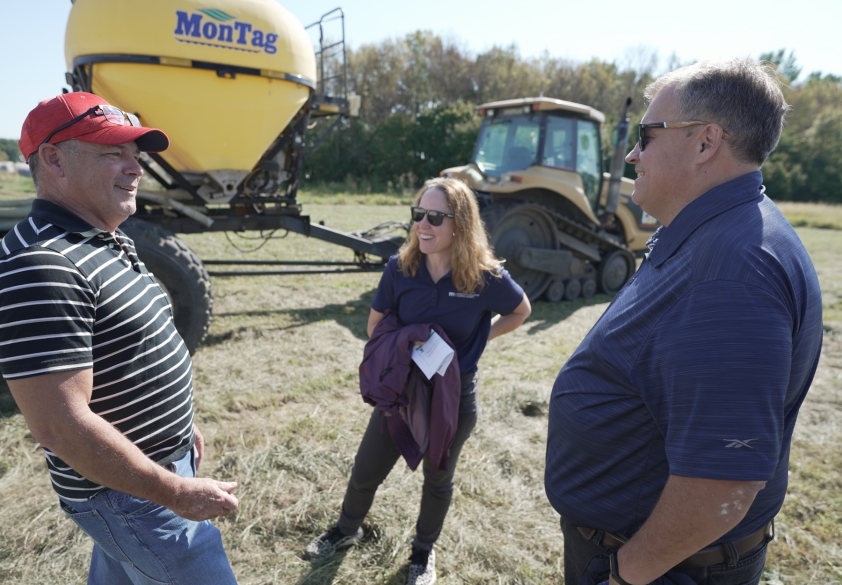
A new approach
When Mike Young floated the idea of adopting a no-till approach to growing soybeans on his farm, some of his neighbors had doubts.
“I was told the best thing I could do was sell my land to someone who really knows how to farm,” Young jokingly recalled in front of his farm outside of Waverly.
Despite the doubts, he moved forward with this method, recognizing the positive impact on soil health that comes from keeping the soil intact. His persistence paid off. Twenty years later, his farm is thriving with rolling hills of healthy beans grown in fertile soil full of earthworms and microbes that support robust crops.
He’s ready to show others how his approach to cultivation can be a model for thousands of other farms across Minnesota too, including MPCA Commissioner Katrina Kessler and Department of Agriculture Commissioner Thom Petersen, who visited Young’s farm on a sunny morning in late September.
A generational investment
In July 2024, the U.S. Environmental Protection Agency awarded the state $200 million to cut climate pollution from our food systems through the climate-smart food systems (CSFS) initiative. The initiative is designed to equip growers, processors, nonprofits, and local communities with the tools they need to build a food system that reduces waste and climate pollution while nourishing Minnesotans.
In collaboration with other state agencies, local governments, and Tribal Nations, the MPCA will distribute the funds through multiple programs over the next five years. A portion of which will help farmers across Minnesota adopt climate-friendly practices like the ones Young implemented.
“Farms are the start of our food system, and people around the world are fed with food grown right here in Minnesota,” said MPCA Commissioner Kessler. “Mr. Young’s farm demonstrates the win-win-win of climate-smart ag practices. Healthier soils grow better food and reduce pollution. We’re excited to help farmers across the state implement a similar approach on their land through the climate-smart food systems initiative.”
Doubling down on success
Funding for farmers is flowing through well-established programs with a proven record of success. This includes the Minnesota Agricultural Water Quality Certification (MAWQC) program — a voluntary initiative that allows farmers to earn certification through practices like enhanced efficiency fertilizer, crop diversification, and land management that reduce pollution and increase resilience to extreme weather.
MAWQC has demonstrated its ability to reach farmers. Since 2014, more than 1.2 million acres of Minnesota farmland have been certified with over 1,690 producers enrolled. Conservation practices implemented through the program cut climate pollution from Minnesota farms by more than 58,000 metric tons of carbon dioxide per year — the equivalent of taking about 13,750 cars off our roads. Pairing the funding with one-on-one technical assistance provided by MAWQC will effectively and efficiently expand the reach and impact of this program to new farmers across Minnesota.